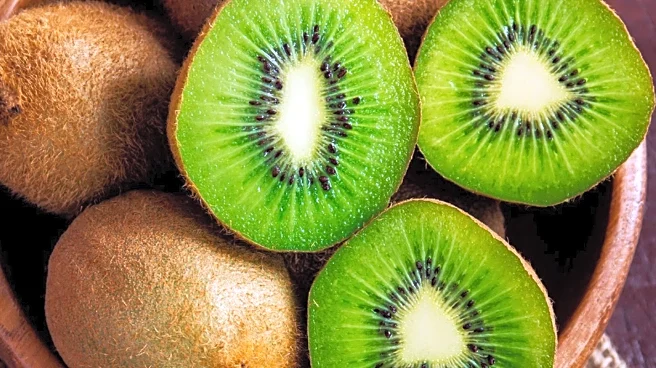What's Happening?
Recent guidelines from the British Dietetic Association have introduced new dietary recommendations for managing chronic constipation. The guidelines, based on an analysis of 75 clinical trials, suggest
that consuming kiwifruit, mineral water, magnesium supplements, and rye bread can effectively alleviate constipation symptoms. Notably, the guidelines challenge the traditional emphasis on high-fiber diets, indicating a lack of strong evidence supporting their effectiveness for constipation relief. Instead, they recommend a more personalized approach, including the consumption of two to three kiwifruits daily for at least four weeks, which has been shown to improve stool bulk and ease passage. Additionally, drinking mineral water and consuming magnesium supplements are advised, although caution is recommended for individuals with kidney disease or those on certain medications. Rye bread is also highlighted as more effective than white bread or common laxatives, though it may not be suitable for those with coeliac disease.
Why It's Important?
These new guidelines could significantly impact dietary practices and public health recommendations concerning constipation management. By shifting focus from a generic high-fiber diet to more specific food items like kiwifruit and rye bread, the guidelines offer a tailored approach that could improve patient outcomes. This change may influence healthcare providers to adopt more individualized dietary advice, potentially leading to better management of chronic constipation. The recommendations also highlight the importance of consulting healthcare professionals when considering supplements, particularly for individuals with pre-existing health conditions. This approach underscores a move towards evidence-based dietary interventions, which could enhance the effectiveness of treatment plans and improve quality of life for those affected by chronic constipation.
What's Next?
As these guidelines gain traction, healthcare providers may begin to incorporate them into patient care strategies, potentially leading to broader acceptance and implementation. Further research could be conducted to strengthen the evidence base for these recommendations, particularly in diverse populations. Additionally, public health campaigns might emerge to educate the public on these new dietary strategies, emphasizing the benefits of kiwifruit and rye bread for digestive health. The guidelines may also prompt discussions within the medical community about revising existing dietary recommendations for constipation, potentially influencing national dietary guidelines in the future.
Beyond the Headlines
The shift away from high-fiber diets for constipation relief could have broader implications for dietary guidelines and public perceptions of fiber's role in digestive health. This development may lead to a reevaluation of fiber's overall health benefits and its place in dietary recommendations. Furthermore, the emphasis on personalized dietary advice reflects a growing trend in healthcare towards individualized treatment plans, which could extend beyond constipation management to other areas of health and nutrition.










